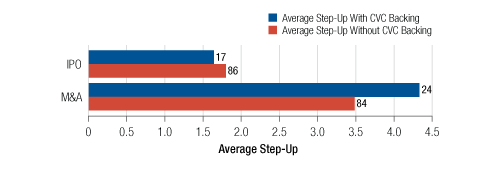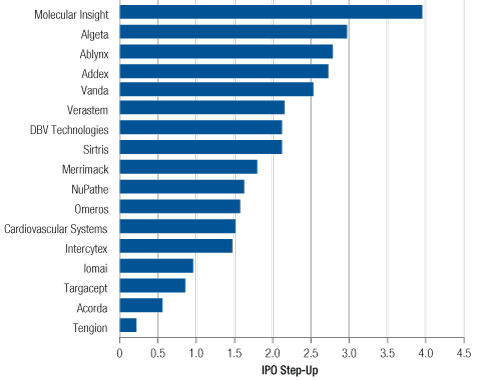Corporate Investors Boost M&A Step-Ups, But Not IPOs
This article was originally published in Start Up
Executive Summary
Corporate venture capital groups have made an impact on life science investing in recent years, but when it comes to going public, the biotechs they back aren’t seeing an extra boost.
In mid-2011, START-UP noted how private biopharma companies with corporate investors were being acquired for better returns than their peers with no corporate venture backing. (See (Also see "Corporate VC Backing Influences Private M&A Step-Ups" - Scrip, 1 Jun, 2011.).) With the IPO window cracking open a tiny bit in 2012, we have decided to run the same analysis for biotechs going public – and update the data for acquisitions, as well.
First, the IPOs: we used Elsevier’s Strategic Transactions to gather valuations for 103 biopharma IPOs from January 2006 through August 2012. Device, diagnostic, and research tools companies were excluded. To measure the (theoretical) return on investment, we took the IPO valuation divided by the total venture capital invested. Non-US listings were included when we could find the total money raised.
(For a separate analysis of the step-ups biotech firms are gaining in valuation from final venture round to IPO, see in this issue (Also see "The Final Step Out The Biotech IPO Window Is A Small One" - Scrip, 23 Oct, 2012.).)
Of those companies, 17 had corporate venture backing, and they averaged a 1.6x step-up, slightly lower than the 1.8x for the 86 firms without corporate investors. That’s the opposite of what we uncovered for acquisitions. Just as we found in our 2011 analysis, corporate-backed biotechs fare better when selling, with an average 4.3x step-up, compared with those without (3.5x). (See Exhibit 1.)
Exhibit 1
Corporate Venture Influence On IPO Vs. M&A Step-Ups
Notes: Chart includes biopharma IPOs and M&As from January 2006 to August 2012 for which step-ups could be obtained. For IPOs, some non-US listings were included when we could obtain total money raised. Numbers to the right of each bar reflect the number of deals in each category.
Elsevier’s Strategic Transactions
Some corporate venture groups have been around for decades, but a growing number of drug companies have added venture in recent years. Many are slashing internal research budgets, but all agree that it’s crucial to look for innovation outside their walls. Venture investments are but one scouting mechanism, and traditional VCs, aware that acquisition is the most likely exit strategy for their biotech investments, say the corporate groups are an important, even crucial part of the landscape. (See (Also see "Corporate Venture Eyes The Early Stage" - Scrip, 13 Sep, 2012.).) But a start-up with corporate investors that rings the IPO bell isn’t necessarily in a celebratory mood, says one veteran life science VC. “If you have a corporate backer and have to go the IPO route, it means you weren’t successful selling the company before going public,” says InterWest Partners general partner Chris Ehrlich. It’s worth noting the corporate investor is rarely the eventual buyer when there is an acquisition. Since 2006, only three of 24 acquired companies with CVC backing were bought by the CVC parent.
Despite the market turmoil in recent years, IPO returns have stayed consistent – in terms of corporate VC influence – before and after the recession. Of the IPOs that took place before June 2008, the 11 firms with corporate investors secured on average a 2x return, and the 49 without corporate backers averaged 3.4x. Post-recession, only six corporate-backed companies have debuted, with an average 1.6x return, compared with a 2x multiple for firms without corporate investors.
Of the total 17 biopharmas with corporate venture investors, radiopharmaceuticals developer Molecular Insight Pharmaceuticals Inc. scored the highest IPO multiple at 4x in February 2007. [See Deal] (It has since gone private after filing for Chapter 11 bankruptcy in 2011.) Siemens Venture Capital was a shareholder, joining the company’s $28 million Series C round in April 2005. [See Deal] In fact, all but four of the 17 CVC-backed IPOs achieved greater than 1x returns. (See Exhibit 2.)
Exhibit 2
Most CVC-Backed Biopharma Companies Achieve >1x IPO Multiple
Note: Chart shows theoretical IPO returns of the 17 biopharmas analyzed with corporate venture backing from January 2006 to August 2012.
Elsevier’s Strategic Transactions
Only two companies from this list of 17 went public and then were acquired: Sirtris Pharmaceuticals Inc., which counted Genzyme Ventures and Novartis BioVenture as shareholders, was bought by GlaxoSmithKline PLCfor $720 million [See Deal] about a year after Sirtris completed a $69 million IPO. [See Deal] And MedImmune Ventures-backed Iomai was acquired by Intercell AG for $172 million [See Deal]following Iomai’s $31 million public offering in 2006. [See Deal]
Johnson & Johnson Development Corp. and SR One, GSK’s venture arm, were the most active corporate investors, each backing four companies that went public.

